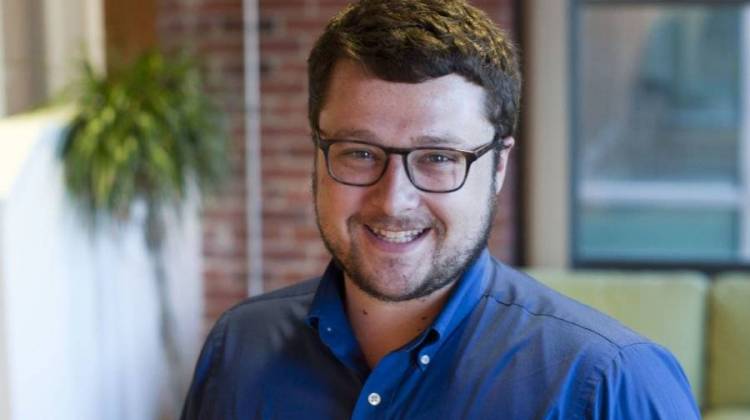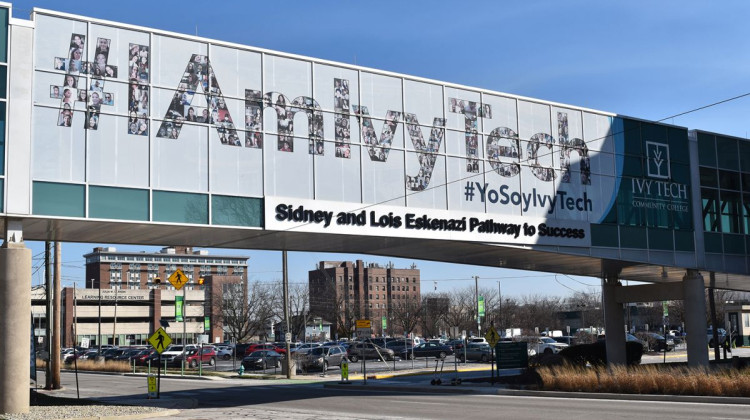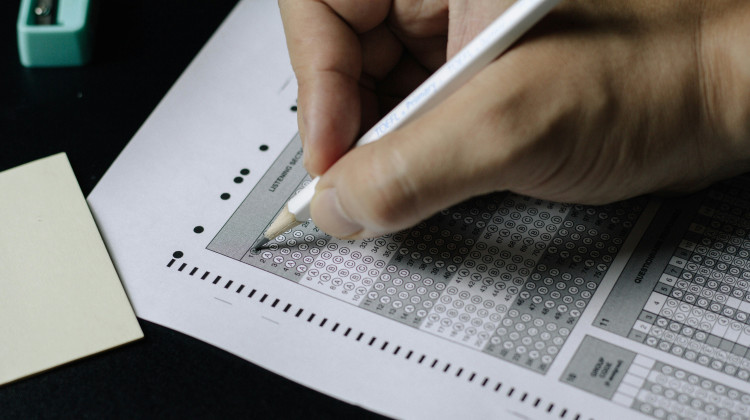A new report offers suggestions for Indiana’s education colleges and school corporations on how to better support young educators and prevent them from leaving the profession or seeking another teaching job.
The report, “We’re In This Together,” released this month by Teach Plus, a national organization that trains teachers to be policy advocates, calls for increased communication and data sharing between education college and school districts.
Co-author Patrick McAlister, policy director at Teach Plus-Indianapolis, said retention and an ongoing teacher shortage continues to stress school leaders and hurt student learning.
If districts can tell preparation programs about their future need for a certain type of teacher, McAlister said, districts could start building relationships with freshman at a school of education.
The report also found a need to “improve the quality of special needs education” for for non-special needs teachers in Indiana.
McAlister spoke with Indiana Public Broadcasting’s Eric Weddle about the need for policymakers, colleges and local superintendents to understand challenges new teachers face.
WFYI: What was the reason behind creating this report?
McAlister: Our teachers were really interested in the issue of teacher preparation. They had come through a variety of programs and had a variety of experiences — some very positive with really good outcomes and a lot of support. And some had gaps. So they were naturally interested in what does the process look like writ large. There has been a lot of reports on teacher development at the national level, but it’s really been heavily focused on coming from the policy maker and university perspective.
So what we really wanted to do was get with teachers and teacher candidates — juniors and seniors in college — and also those who support those early career teachers — assistant principals, principals, teacher coaches, college professors — to see what their perspectives are on the changes that they want to see made in teacher preparation.
WFYI: So when these students graduate from a teaching college or when they’re in their first few years of teaching, what are some of the biggest challenges that they’re going to face?
McAlister: One of the biggest challenges they have is the challenge that I had as an early career teacher. I didn’t have a lot of field experience before I walked into the classroom. Your experiences are controlled and they are kind of structured. Some universities do a really great job of getting you into the classroom quickly but a lot of times you don’t have a lot of control over your clinical experience. And so something like a teacher residency model which is something that (Indianapolis Public Schools) is pursuing and other charter schools are very, very interested in would give you that long term personal deep connection with a set of children. And the most important part being supported by a master teacher.
WFYI: And what would that offer them?
McAlister: Getting that constant feedback, getting that support in lesson design. That kind of structure would allow for that knowledge transfer I think in a more robust way.
IWFYI: What you’re saying is that a lot of these issues is kind of what builds up to why we’re seeing teachers shortage and seeing this large turnover of teachers in Indianapolis. Would you say that’s true?
McAlister: Yeah. For me at least, the first couple of years of teaching were kind of a trial by fire. You go through a lot, you learn a lot in your experience but you have to work very hard to get there. Not everyone makes it through. One of our teachers was hired two days before the school year started and I’m sure this is a very familiar story to a lot of teachers. She was handed her keys and said: “Here, good luck. Make sure your room looks good” was the feedback she got from her school. She’s no longer working at that school. She’s now a mentor teacher at another school. You know that kind of lack of support, both from her experience in her preparation program and also at the school level, I think we lose a lot of folks that way.
WFYI You interviewed a lot of teachers for this report, so what would you say you learned that they want to have — whether it’s more knowledge or experience before they wind up teaching in front of their own classroom.
McAlister: Couple of things that came up were sort of a perspective of a lack of practical experience that teachers need to be really successful. We had one person who participated who said that they didn’t know what an IEP was — an individualized education plan — and they were a senior at a school of education. And again, it’s hard to sort of paint with a wide brush you’re only looking at qualitative research but that was a common thread that came up in the report.
WFYI: So you’ve given this report to lawmakers at the state and in the upcoming legislative session you’ll be talking to them more about developing a model teacher residency program. We’re going to keep an eye on that. But looking ahead, what change do you hope this report leads to?
McAlister: You know, districts and preparation programs really solidify a stronger symbiotic relationship and because it’s the only way we’re going to be able to bring in the crop of effective, talented teachers that we need.
Contact WFYI education reporter Eric Weddle at eweddle@wfyi.org or call (317) 614-0470. Follow on Twitter: @ericweddle.
 DONATE
DONATE











 Support WFYI. We can't do it without you.
Support WFYI. We can't do it without you.